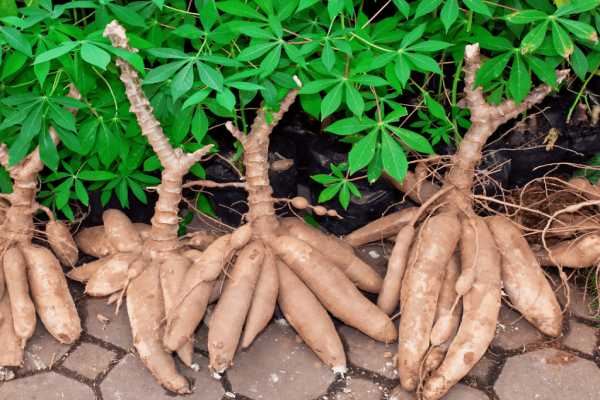How To Start A Cassava Farming And Processing Business (Step-by-Step)
As the use of cassava produce is increasing in Nigeria, so also is the cassava farming and processing becoming more lucrative. The importance of this farm product cannot be overemphasized as a source of livelihood and food for millions of Nigerians.
Many homes consume cassava products every day. Cassava can be processed into garri, wheat flour, animal feed, commercial caramel, and lots more. Garri processing is a very significant sector in the cassava farming business.
With the increasing population in Nigeria and other African countries, so also will the demand for cassava products continue to grow thereby increasing the income generated from cassava farming. Cassava products will always be categorized as a cash crop because of their guaranteed demand and reason profit after-sales.

The major reason why a lot of people have not ventured into cassava farming with a guaranteed high level of turnover is capital. Capital is a major factor for the startup of any business.
Considering the ongoing economic recession being experienced in Nigeria, the Nigerian government through the country’s Bank of Agriculture (BOA) has now made more agriculture loans available to millions of potential and active farmers. Interested farmers who are willing and committed to development are encouraged to take advantage of these government loans and incentives to enable them startup/improve their own cassava farms.
How To Start Cassava Farming In Nigeria
Cassava farming is a lucrative business to start that guarantees sell out of almost all your harvest. Here is a step-by-step template on how to start a cassava farming and processing business in Nigeria.
1. Select a Good Site for your Cassava Farm
In selecting a site where you wish to set up your cassava farm, an area with drained loamy soil, adequate rainfall, and warm & moist climate conditions should be selected because cassava grows best in such areas.
The location where you choose to set up your cassava farm is very important. Ensure that local farmers around are able to attest to the richness of the soil before acquiring the land.
2. Improve the Soil for Planting the Cassava
This step can be totally ignored if you already selected fertile land to grow your cassava crop. In case you didn’t acquire fertile land then more money has to be expended to improve the soil. The under-listed are some of the ways in which soil can be improved:
• Manure your soil
• Preparation of good seedbeds
• Planting the cassava along with other crops, and more.
The richness of the soil is essential for the cultivation of cassava else you will lose lots of money so errors like this should totally be avoided.
Sincerely, it is advisable to choose a very fertile land in order to avoid the cost associated with having to improve the soil for the cultivation of cassava stem cuttings.
3. Select the Best Cassava variety to Plant
There are a variety of cassava breeds that can grow. In selecting the right breed attention should be given to the type which will be required by your target market, gives great yields, grows fast, and are highly resistant to pests and diseases.
The success of a cassava farm is dependent on the selection of the right breed to grow.
4. Select Healthy Cassava Stem Cuttings
Cassava stem cutting is used to grow cassava crops. Choosing healthy stems is very important to growing the rich cassava that your market requires. Cassava stems can be purchased in town markets and villages. After the first purchase, subsequent ones can be gotten from your own farm.
5. Plant the Cassava Right
Planting the cassava within all right conditions will ensure you reap a healthy harvest. Chances of good yield will be increased and the availability of cassava harvest when buyers need it.
6. Setup and Production Cost
You can become a millionaire by proper implementation of all guidelines in starting up your cassava farm. In order to avoid making a loss, you need to understand the cost of starting up. Here are the areas in which cost should be ascertained:
• Cost of Land
• Land preparation
• Cassava stem cuttings
• Fertilizers
• Fermentation tank
• Hydraulic press
• Hammermill
Many other costs and unforeseen costs are not listed.
7. Marketing Your Cassava Products
After growing and harvesting your crops it is important to you ensure you sell your harvest to the right buyer and at the right price in order to maximize return. Here is a quick rundown of how to market your cassava produce:
• Identify your farm market
• Join farm associations
• Supply to hotels and restaurants
• Set up an online store
• Supply to food markets
• Own a retail store
FAQs on Cassava Farming And Processing Business
Is cassava Processing profitable?
According to a case study in Otukpo Local Government Area in Nigeria, the benefit-cost ratio was 2.15. This means that the benefits gotten from processing cassava yielded more than two times the original start-up cost. Thus, cassava processing is profitable
How many cassava stems in a bundle?
The stem cuttings are needed to plant cassava. A bundle of cassava stem cuttings contains 35 sticks of cassava
How many months does it take cassava to be harvested?
It usually takes about 8 to 10 months for cassava to be mature for human consumption, harvesting usually takes place during this time, though some leave theirs till 9 to 12 months
How many bags of cassava makes a ton?
More than 250kg garri can be processed from 1 ton of fresh cassava. This unit of garri can be sectioned into 5 bags of garri each weighing 50kg.
Cassava farming will always be listed as one of the very lucrative agricultural ventures if done in the right way. Weighing from the benefits to be derived from investing in this business, one can be sure of a full return on investment. Even in its raw form it can be sold for profits, and when processed more channels of wealth are being opened.
Read Also: The 10 Agritech Companies in Nigeria
Try as much as possible to follow the steps enumerated above when setting up your cassava farm and you end up producing the right crop. There will always be a demand for cassava produce.

![Top 10 Best Engineering Colleges in Canada [2023 Ranking] 3 Top 10 Best Engineering Colleges in Canada](https://allroundgist.com/wp-content/uploads/2022/12/best-engineering-colleges-in-canada-img_163534-min.jpg)
![R. Kelly Net Worth And Biography 2022 [Height, Age, Songs] 4 R. Kelly Net Worth And Biography [Height, Age, Songs]](https://allroundgist.com/wp-content/uploads/2022/09/r-kelly-net-worth-and-biography-img-134256-min.jpg)


![20 Richest States In The United States 2022 [GDP Per Capita] 7 20 Richest States In The United States [GDP Per Capita]](https://allroundgist.com/wp-content/uploads/2022/10/richest-states-in-the-united-states-img_16221-min.jpg)

https://t.me/officials_pokerdom/3566
https://t.me/s/iGaming_live/4864
I loved as much as you will receive carried out right here.
The sketch is tasteful, your authored material stylish.
nonetheless, you command get bought an nervousness over that you
wish be delivering the following. unwell unquestionably come more formerly again since exactly
the same nearly very often inside case you shield this increase.
If you’re searching for a trustworthy and powerful financial service that handles not only cryptocurrency transactions like buying Bitcoin but also supports a wide range
of fiat operations, then you should definitely check out this discussion where users
share their feedback about a truly all-in-one crypto-financial platform.
The opinion shared by users in the discussion made it
clear that this platform is more than just a simple exchange
– it’s a full-fledged financial ecosystem for both individuals and companies.
What’s particularly valuable is the level of detail
provided in the forum topic, including the pros and
cons, user reviews, and case studies showing how enterprises have integrated
the platform into their operations.
I’ve rarely come across such a balanced discussion that addresses both
crypto-savvy users and traditional finance professionals, especially in the context of business-scale needs.
It’s a long read, but this forum topic offers some of
the most detailed opinions on using crypto platforms for corporate and fiat operations alike.
Definitely worth digging into this website.